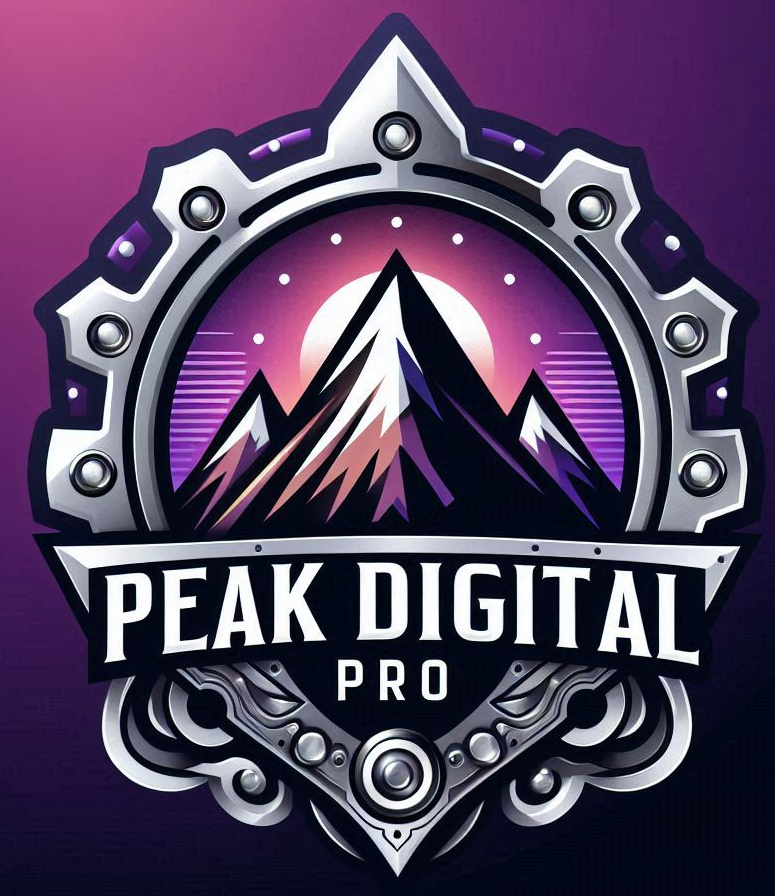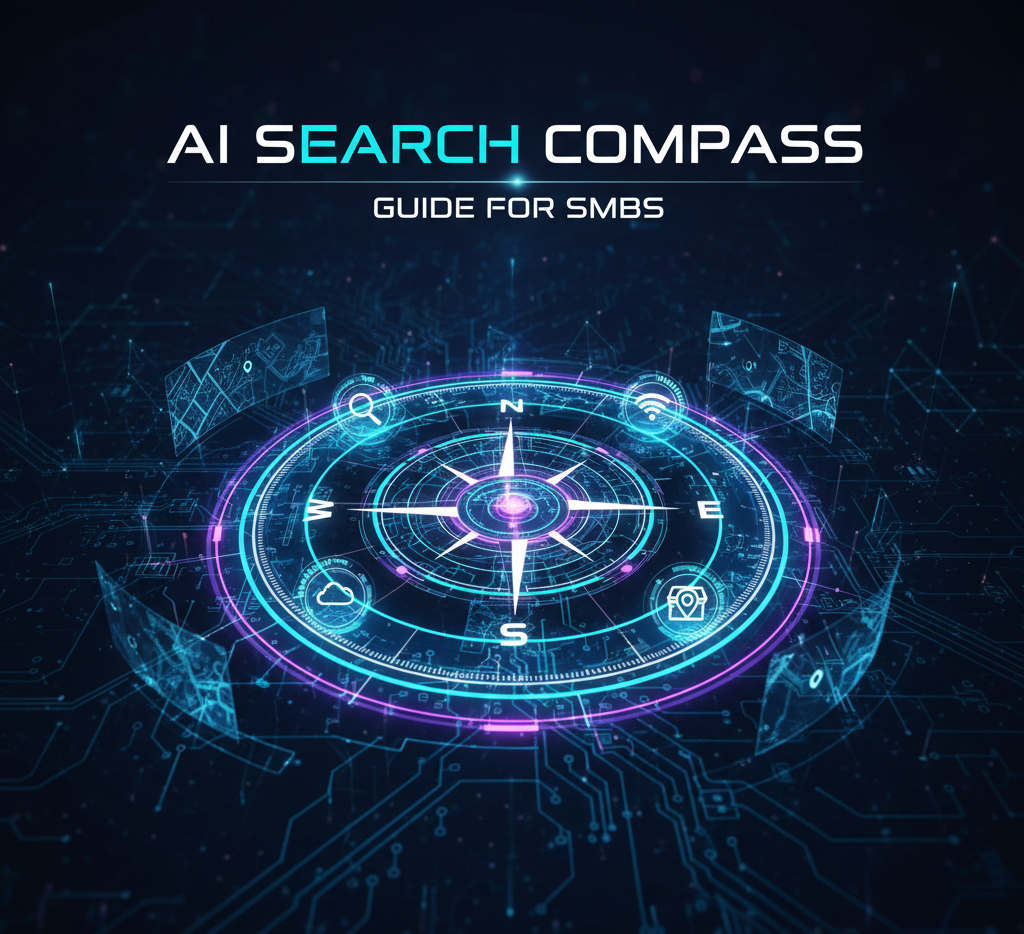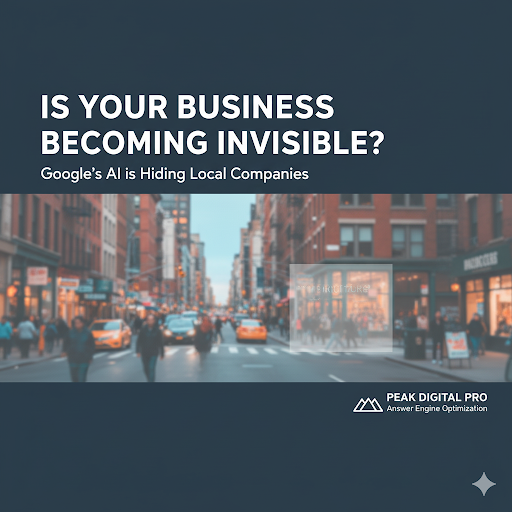What Is Pay Per Click? Guide for US and Colorado Business Owners 2025
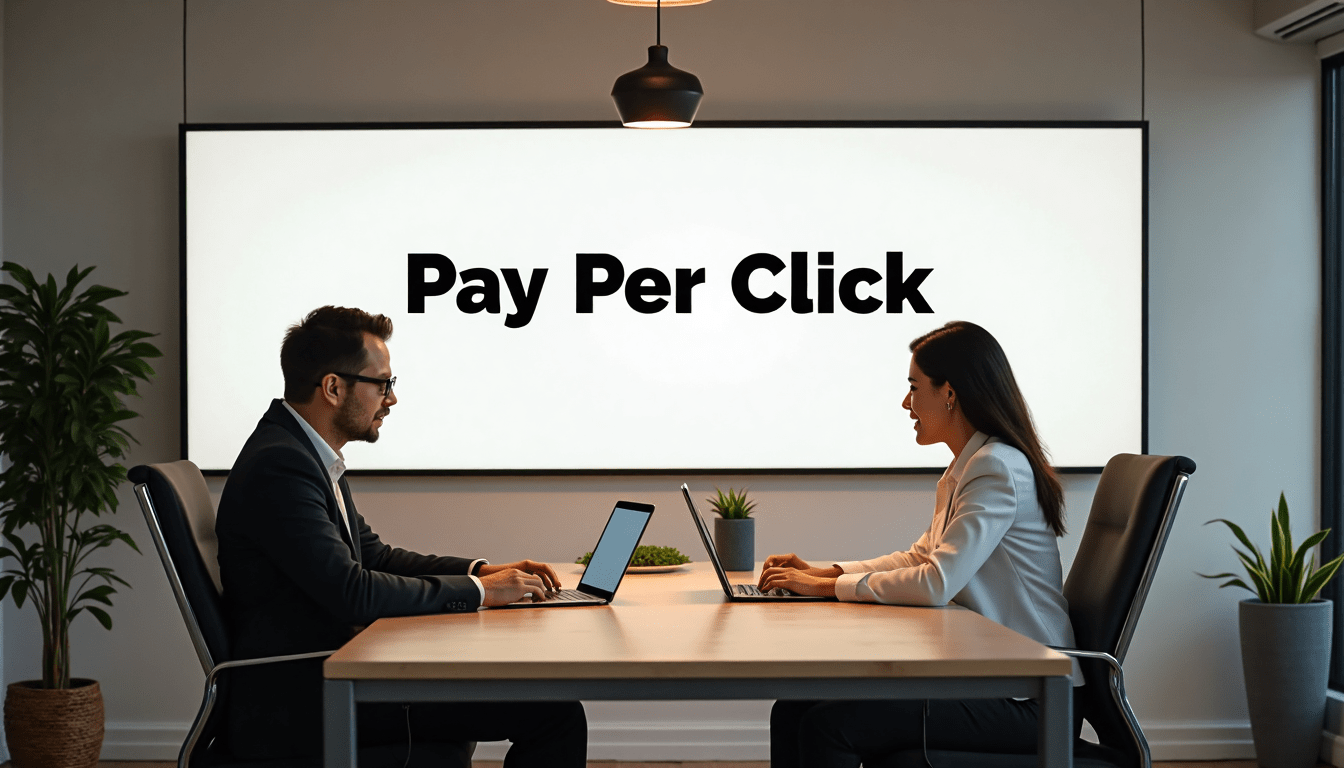
Businesses across the US and Colorado are pouring resources into digital ads, hoping to capture attention in a crowded online world. Yet here is a fact that stands out: Google alone commands over 90 percent of the global search engine market share . That sounds unbeatable. The twist? Small and midsize businesses can level the playing field with pay per click advertising, using smart targeting and precise budgets to win local customers where it matters most.
Table of Contents
Quick Summary
| Takeaway | Explanation |
|---|---|
| Targeted Reach | PPC advertising enables businesses to connect with potential customers at the exact moment they search for relevant products or services, allowing for precise demographic and geographic targeting. |
| Budget Control and Cost Efficiency | PPC allows businesses to start with minimal daily budgets and scale based on performance, ensuring that they pay only for genuine customer interest through clicks. |
| Data-Driven Optimization | Campaigns can be continuously refined using detailed analytics like conversion rates and cost per acquisition, empowering businesses to maximize their marketing efficiency. |
| Adoption of AI and Machine Learning | Leveraging AI tools for automated bidding and audience targeting can enhance campaign performance, helping businesses adjust strategies based on real-time data. |
| Multi-Platform Approach | Evaluating and utilizing various PPC platforms based on specific audience demographics and advertising objectives can lead to better performance and overall marketing success. |
Understanding Pay Per Click Advertising Basics
Pay per click (PPC) advertising represents a powerful digital marketing strategy that enables businesses to drive targeted traffic and generate immediate online visibility. At its core, PPC is an advertising model where businesses pay a fee each time one of their digital advertisements receives a click.
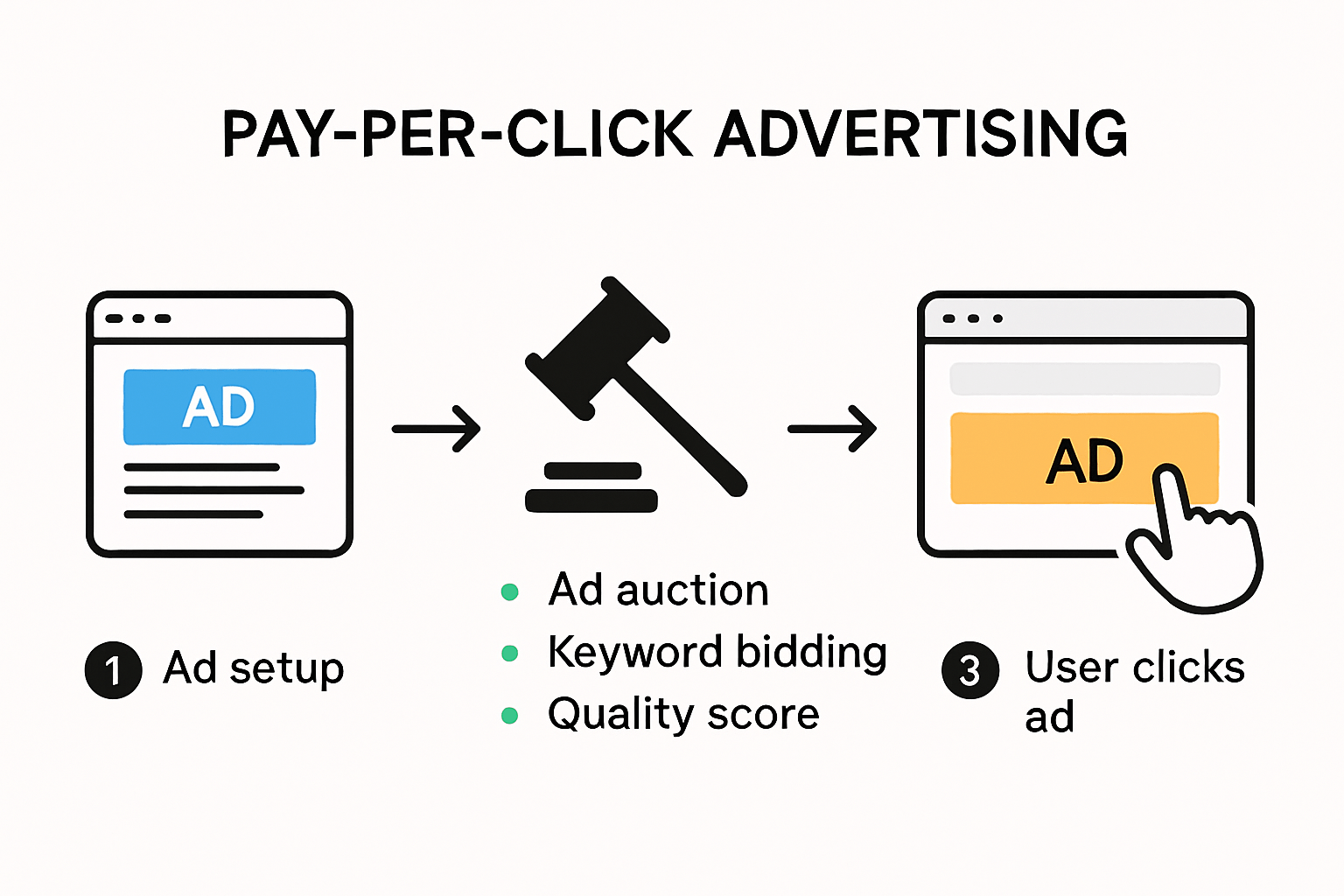
How PPC Advertising Works
PPC advertising operates through a sophisticated auction system where advertisers compete for digital ad placement across search engines and online platforms. According to the US Chamber of Commerce , the process involves strategic keyword selection and bidding mechanisms that determine an advertisement’s visibility and placement.
Businesses select specific keywords relevant to their products or services, then bid on these terms. When potential customers search using those keywords, the advertiser’s ad may appear in prominent positions. The placement isn’t solely determined by the highest monetary bid but also by the ad’s quality score . This score evaluates factors like ad relevance, expected click-through rate, and the quality of the destination landing page.
Strategic Benefits of PPC Advertising
PPC advertising offers several significant advantages for businesses seeking immediate and measurable marketing results. Targeted reach allows companies to connect with potential customers at the precise moment they’re searching for specific products or services. Unlike traditional advertising methods, PPC provides granular control over audience targeting, enabling businesses to specify demographics, geographic locations, device types, and even time of day for ad display.
The measurability of PPC campaigns sets them apart from traditional marketing approaches. Businesses can track every aspect of their advertising performance, including:
- Clicks received
- Conversion rates
- Cost per acquisition
- Return on advertising spend
This data-driven approach allows for continuous optimization and refinement of marketing strategies. According to research from the US Chamber of Commerce , effective PPC management involves selecting appropriate keywords, setting precise budgets, creating compelling ad copy, and consistently analyzing performance metrics to maximize return on investment.
For businesses in competitive markets like Colorado, PPC advertising provides an opportunity to level the playing field. Small and medium-sized enterprises can compete with larger corporations by implementing smart, targeted advertising strategies that maximize their marketing budgets.
The flexibility of PPC advertising means businesses can start with modest budgets and scale their campaigns as they see positive results. Whether you’re a local Colorado business or a national brand, PPC offers a adaptable marketing solution that can be tailored to specific business goals and financial constraints.
Understanding the nuances of PPC advertising requires strategic thinking and continuous learning. Successful campaigns are not about spending the most money, but about smart targeting, compelling messaging, and data-driven optimization.
How Pay Per Click Benefits Local Businesses

Local businesses face unique challenges in digital marketing, and pay per click (PPC) advertising emerges as a strategic solution to overcome these obstacles. Unlike traditional marketing methods, PPC offers precise targeting and immediate visibility that can transform how small and medium-sized enterprises connect with potential customers.
Hyper-Local Targeting Capabilities
PPC advertising provides unprecedented geographical precision for local businesses. Entrepreneurs can configure their advertisements to appear exclusively to users within specific zip codes, neighborhoods, or radius distances from their physical business location. Google Ads allows businesses to set geotargeting parameters as narrow as a few miles, ensuring marketing budgets are spent reaching the most relevant potential customers.
This localized approach means a coffee shop in downtown Colorado Springs can target advertisements to residents and visitors within walking distance, dramatically increasing the likelihood of attracting foot traffic. Small businesses can compete effectively against larger competitors by focusing their advertising efforts on their immediate community.
Cost-Effective Marketing Strategy
PPC advertising represents an incredibly efficient marketing approach for local businesses operating with limited budgets. Budget control becomes a critical advantage. Unlike traditional advertising platforms that require substantial upfront investments, PPC platforms allow businesses to start with minimal daily spending and scale incrementally based on performance.
Businesses can set precise daily or monthly budget caps, ensuring they never exceed their financial comfort zone. The pay only for performance model means companies exclusively pay when potential customers demonstrate genuine interest by clicking their advertisement. This direct correlation between spending and potential customer engagement makes PPC an attractive option for budget-conscious local enterprises.
Measurable and Adaptable Campaigns
One of the most significant benefits of PPC for local businesses is the ability to track and analyze campaign performance with unprecedented detail. Search Engine Journal highlights that modern PPC platforms provide comprehensive analytics that reveal:
- Exact number of ad clicks
- Geographic origin of clicks
- Time of day with highest engagement
- Conversion rates
- Cost per customer acquisition
These insights enable local businesses to continuously refine their marketing strategies. An automotive repair shop, for example, could discover that their ads perform best between 5 PM and 8 PM when commuters are more likely to search for vehicle services. This data-driven approach allows for real-time campaign adjustments, maximizing marketing efficiency.
For Colorado businesses, PPC offers a competitive edge in a diverse and dynamic market. Whether you’re a restaurant in Denver, a ski equipment rental in Vail, or a boutique in Boulder, PPC advertising provides a flexible, targeted approach to reaching potential customers.
The strategic implementation of PPC goes beyond mere advertising. It represents a sophisticated method of understanding customer behavior, testing market receptiveness, and building brand awareness. Local businesses can use PPC not just as an advertising tool, but as a comprehensive market research platform that provides immediate feedback and actionable insights.
Here is a table summarizing the main PPC advantages for local businesses, organized by capability and explanation:
| PPC Advantage | Description |
|---|---|
| Hyper-Local Targeting | Ads appear only to users in specific geographies, like zip codes or neighborhoods |
| Cost-Effective/Budget Control | Set precise daily/monthly caps; only pay per actual click, making spend predictable and scalable |
| Immediate & Measurable Visibility | Businesses receive instant analytics on ad performance, conversion rates, and ROI |
| Flexible Campaign Management | Easily pause, adjust, or scale campaigns in real time based on performance |
| Enhanced Market Research | Gain customer insights from ad engagement analytics and geographic/demographic data |
Best Practices for Pay Per Click Success in 2025
As digital marketing continues to evolve, businesses must adapt their pay per click (PPC) strategies to remain competitive in 2025. Successful PPC campaigns now require a sophisticated approach that combines advanced technology, precise targeting, and strategic thinking.
Leveraging AI and Machine Learning
The future of PPC advertising is deeply intertwined with artificial intelligence and machine learning technologies. Google Ads has increasingly integrated AI-driven tools that help businesses optimize their advertising strategies. These advanced algorithms can analyze vast amounts of data to predict user behavior, recommend optimal bidding strategies, and automatically adjust campaign parameters in real-time.
Businesses should embrace automated bidding strategies that utilize machine learning. These AI-powered approaches can dynamically adjust bids based on multiple factors, including user intent, device type, time of day, and historical performance data. The key is to combine AI recommendations with human strategic oversight, ensuring that automated systems align with specific business objectives.
Hyper-Personalized Audience Targeting
In 2025, successful PPC strategies demand unprecedented levels of audience personalization. Search Engine Journal suggests that businesses must move beyond basic demographic targeting to create micro-segmented audience profiles . This approach involves leveraging multiple data points to create highly specific audience groups.
Effective targeting now requires integration of:
- Behavioral data
- Intent signals
- Demographic information
- Previous interaction history
- Contextual relevance
Businesses should invest in sophisticated audience research tools that provide deep insights into customer behavior. The goal is to create advertising experiences that feel personally tailored to individual users, increasing engagement and conversion rates.
Comprehensive Performance Optimization
Successful PPC campaigns in 2025 require a holistic approach to performance optimization. This means going beyond traditional metrics and developing a comprehensive understanding of advertising effectiveness. Businesses must focus on creating seamless user experiences that extend from initial ad click to final conversion.
Key optimization strategies include:
- Continuous landing page refinement
- Mobile-first design approaches
- Fast-loading, responsive web experiences
- Clear and compelling call-to-action elements
- Consistent messaging across all touchpoints
The most successful businesses will treat PPC not as a standalone marketing tactic, but as an integrated component of a broader digital marketing strategy. This means aligning PPC efforts with search engine optimization, content marketing, and overall brand messaging.
For Colorado businesses, staying ahead of PPC trends means being adaptable and willing to experiment. The digital marketing landscape moves quickly, and what works today may become obsolete tomorrow. Successful companies will maintain a learning mindset, continuously testing new approaches and remaining open to emerging technologies and strategies.
Ultimately, PPC success in 2025 is about more than just technical implementation. It requires a deep understanding of customer needs, a willingness to leverage cutting-edge technologies, and a strategic approach that prioritizes genuine value creation over simple advertising metrics.
The following table summarizes best practice categories for PPC success in 2025, along with their focus and purpose:
| Best Practice Category | Main Focus | Purpose |
|---|---|---|
| AI & Machine Learning | Automated bidding, real-time adjust | Enhance campaign performance and efficiency |
| Audience Personalization | Micro-segmentation, data integration | Tailor ads to specific user needs and behaviors |
| Performance Optimization | Landing pages, user experience | Maximize conversions and ROI from PPC investment |
| Integrated Strategy | Align PPC with other marketing | Create consistent brand messaging and cohesive efforts |
| Ongoing Experimentation | Testing and adapting | Stay competitive as PPC trends and tech evolve |
Choosing the Right Pay Per Click Platform
Selecting the appropriate pay per click (PPC) platform represents a critical decision that can significantly impact a business’s digital marketing success. Different platforms offer unique advantages, and understanding their nuanced capabilities helps businesses make strategic advertising investments.
Search Engine PPC Platforms
Google Ads dominates the PPC landscape, offering unparalleled reach and sophisticated targeting capabilities. With over 90% of global search engine market share, Google provides businesses the most extensive potential audience. Microsoft Advertising (formerly Bing Ads) offers an alternative search engine platform, often featuring lower competition and potentially more cost-effective click rates.
Search engine PPC platforms excel at capturing user intent. When potential customers actively search for specific products or services, these platforms position advertisements precisely where they’re most likely to generate engagement. Businesses can target keywords with remarkable specificity, ensuring their advertisements appear for the most relevant search queries.
Social Media Advertising Platforms
Social media platforms have emerged as powerful PPC alternatives, offering unique targeting capabilities beyond traditional search engines. Facebook Ads provides extraordinary demographic and interest-based targeting, allowing businesses to reach extremely specific audience segments.
Different social platforms cater to distinct audience demographics:
- LinkedIn : Professional B2B targeting
- Instagram : Younger, visually-oriented audiences
- Twitter : Real-time engagement and trending topics
- TikTok : Younger demographics seeking short-form content
These platforms enable businesses to create highly visual, interactive advertisements that can generate significant engagement beyond traditional text-based search ads.
The following table compares key PPC platform types mentioned and their main features:
| Platform Type | Primary Examples | Key Advantages |
|---|---|---|
| Search Engine | Google Ads, Microsoft Ads | Targeting user intent via keywords; wide reach |
| Social Media | Facebook, Instagram, LinkedIn, | Demographic/interest targeting; visual formats |
| Twitter, TikTok | Engagement with highly defined audience segments |
Strategic Platform Selection Criteria
Choosing the right PPC platform requires careful consideration of multiple factors. According to Search Engine Journal , businesses should evaluate platforms based on:
- Target audience demographics
- Budget constraints
- Advertising objectives
- Industry-specific performance metrics
- Competitive landscape
For Colorado businesses, platform selection might involve analyzing local market dynamics. A ski equipment retailer might find more success on visually-oriented platforms like Instagram, while a professional services firm might prioritize LinkedIn’s targeted advertising capabilities.
The most successful PPC strategies often involve a multi-platform approach. Rather than committing exclusively to one platform, businesses can diversify their advertising efforts, testing different channels to determine which delivers the most cost-effective results.
Advanced businesses will implement cross-platform tracking to understand how different advertising channels interact and contribute to overall marketing performance. This holistic approach allows for more nuanced optimization and budget allocation.
Ultimately, PPC platform selection is not a one-size-fits-all decision. It requires ongoing experimentation, performance analysis, and a willingness to adapt strategies based on real-world results. Businesses that approach platform selection as a dynamic, data-driven process will consistently outperform those using static, unchanging advertising approaches.
Frequently Asked Questions
What is Pay Per Click (PPC) advertising?
Pay Per Click (PPC) advertising is a digital marketing model where businesses pay a fee each time their advertisement is clicked. This allows companies to drive targeted traffic to their websites and get immediate visibility online.
How does PPC advertising work?
PPC advertising operates through an auction system where advertisers bid on specific keywords. Ads are displayed based on factors such as bid amount and ad quality, ensuring businesses can target potential customers effectively.
What are the benefits of PPC advertising for local businesses?
PPC advertising offers local businesses several advantages, including hyper-local targeting, budget control, cost-efficiency, and the ability to track campaign performance in real-time, allowing for continuous optimization.
Which PPC platforms should I consider for my business?
For your business, consider using Google Ads for comprehensive reach or explore social media platforms like Facebook and Instagram for demographic targeting. The choice depends on your target audience and advertising goals.
Ready to Win Local Customers With Smarter Pay Per Click?
Are you struggling to turn online searches into real business, even though you know your market is searching right now? Many US and Colorado business owners face wasted budgets, poor local targeting, and the stress of not knowing where their next customer will come from. The guide above highlights the need for focused, measurable pay per click strategies and the critical advantage of AI-driven optimization. That is exactly where Peak Digital Pro comes in.
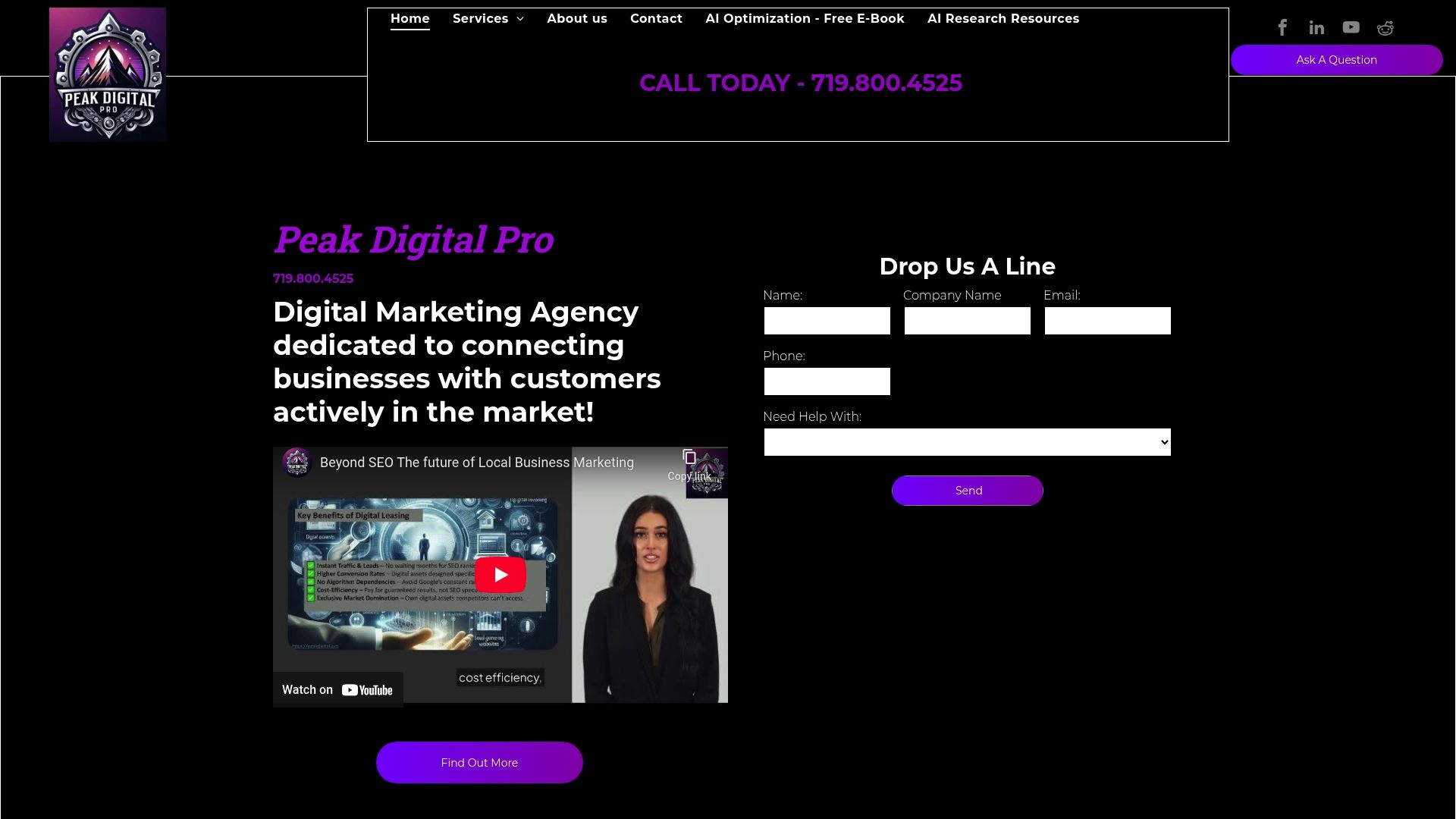
Our Colorado Springs team specializes in helping local businesses master PPC using the same AI-powered tactics covered in this article. Imagine your brand appearing to the right audience at the exact moment they are ready to buy—without the guesswork. Why wait to gain a serious edge over your competitors? Visit Peak Digital Pro now to discover how we can help you attract more customers, grow your sales, and finally make your marketing truly measurable. Take control of your local market today with proven strategies that work.
